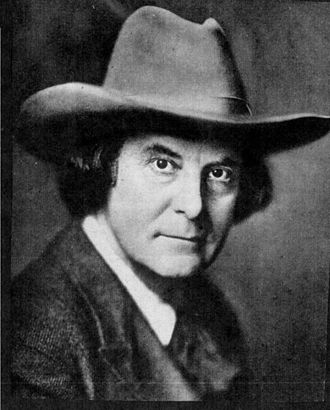Elbert Hubbard

Elbert Green Hubbard (June 19, 1856 – May 7, 1915) was an American writer, publisher, artist, and philosopher. Raised in Hudson, Illinois, he had early success as a traveling salesman for the Larkin Soap Company. Hubbard is known best as the founder of the Roycroft artisan community in East Aurora, New York, an influential exponent of the Arts and Crafts Movement.
Among Hubbard’s many publications were the fourteen-volume work Little Journeys to the Homes of the Great and the short publication A Message to Garcia. He and his second wife, Alice Moore Hubbard, died aboard the RMS Lusitania when it was sunk by a German submarine off the coast of Ireland on May 7, 1915.
Hubbard was born in Bloomington, Illinois, to Silas Hubbard and Juliana Frances Read on June 19, 1856. In the autumn of 1855, his parents had relocated to Bloomington from Buffalo, New York, where his father had a medical practice. Finding it difficult to settle in Bloomington—mainly due to the presence of several already established doctors—Silas moved his family to Hudson, Illinois the next year.[1]:7 Nicknamed “Bertie” by his family, Elbert had two older siblings: Charlie, who was largely bed-ridden after a fall when he was young, and Hannah Frances, nicknamed “Frank” like her mother.[1]:10–11 Charlie died at the age of nine, when Elbert was three-and-a-half years old. Elbert also had three younger sisters who were named Mary, Anna Miranda, and Honor.[1]:11–12
The Hubbard children attended the local public school, a small building with two rooms that overlooked a graveyard. Thirty years later, Elbert described his schooling days as “splendid” and “tinged with no trace of blue…. I had no ambitions then—I was sure that some day I could spell down the school, propound a problem in fractions that would puzzle the teacher, and play checkers in a way that would cause my name to be known throughout the entire township.”[1]:14 Mary would remember her older brother’s role as a school troublemaker, noting that he “annoyed his teachers… occasionally by roaring inappropriately when his too-responsive sense of humor was tickled.”[1]:15
Elbert’s first business venture was selling Larkin soap products, a career which eventually brought him to Buffalo, New York. His innovations for Larkin included premiums and “leave on trial”.[2]
Hubbard described himself as an anarchist and a socialist.[3]:149 He believed in social, economic, domestic, political, mental and spiritual freedom.[3]:ii In A Message to Garcia and Thirteen Other Things (1901), Hubbard explained his Credo by writing “I believe John Ruskin, William Morris, Henry Thoreau, Walt Whitman and Leo Tolstoy to be Prophets of God, and they should rank in mental reach and spiritual insight with Elijah, Hosea, Ezekiel and Isaiah.”[3]:i Yet, common themes throughout his works portray him as a capitalist, with his pro-business beliefs and anti-union beliefs.
Hubbard wrote a critique of war, law and government in the booklet Jesus Was An Anarchist (1910). Originally published as The Better Part in A Message to Garcia and Thirteen Other Things, Ernest Howard Crosby described Hubbard’s essay as “The best thing Elbert ever wrote.”[4]
Another book which was written by Hubbard is titled Health and Wealth. It was published in 1908 and includes many short truisms.
